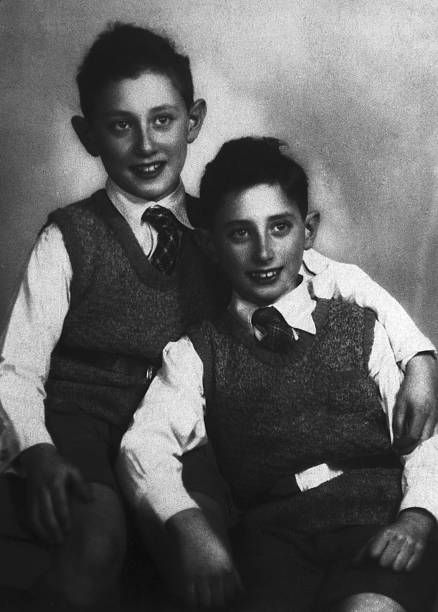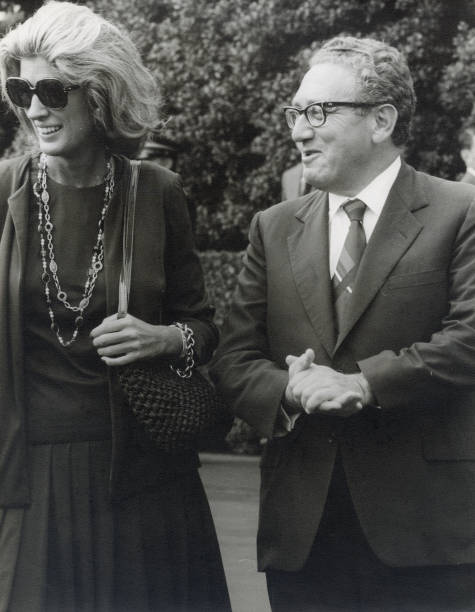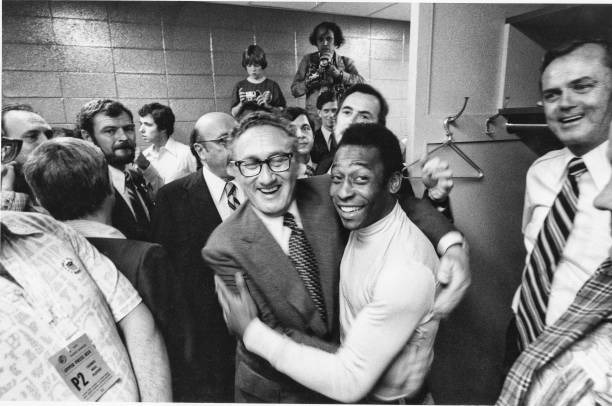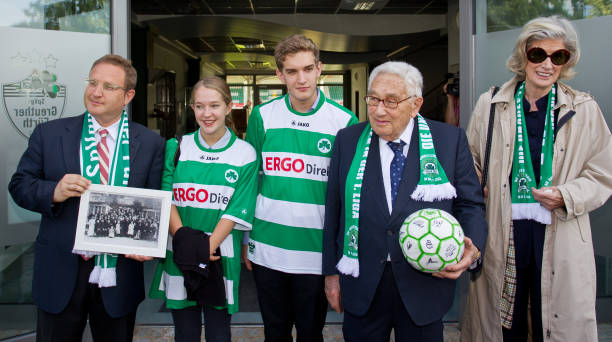
Henry Kissinger, born Heinz Alfred Kissinger in Furth, Germany in 1923, was the 56th US Secretary of State and one of the most influential diplomats in the cold war era. He is one of those people who evoke strong feelings both for and against him as a result of the policies and decisions he championed while he was Secretary of State and also as National Security Advisor.
Early life
As a young man in Germany, his life was turned upside down when the Nuremberg laws were passed. These racist and antisemitic laws paved the way for the persecution of the Jews in Germany. Kissinger’s dad lost his teaching job after the passage of those laws. In addition, Kissinger and his friends were often beaten by Hitler’s youth gangs. A lover of soccer, he would occasionally sneak to attend matches in stadiums despite not being allowed to do so and would get beaten by the guards for doing so. In 1938, his family fled the persecution in Germany but most of his extended family did not make it and 13 of them died in the Holocaust.
In the US, his life normalized and he went on to become a brilliant student. He attended Harvard where he graduated with a summa cum laude in 1950. His educational pursuits did not end there, and he got a masters from the same institution a year later as well as a doctorate in 1954. He was a faculty member at Harvard from 1952 – 1969 before he joined the world of politics, which his life would come to be known for.
Before he finished his studies, he was drafted into the US military and he fought in World War II.
Family life
Kissinger married Annaliese Fleischer, who was also born in Furth, Germany. They got married in 1949 and went on to have 2 kids. However, the couple divorced in 1964. In 1955, while still married to Fleischer, he met Austrian poet Ingeborg Bachmann at a symposium in Harvard and soon a romantic relationship between them developed and went on for several years.
He did not marry Bachmann and instead met and married Nancy Maginnes who he was married to until his death on November 29th 2023, at the age of 100. The two got married 10 years after his divorce from his first wife in 1974.

Secretary of State and National Security Advisor
Kissinger served as National Security Advisor and US Secretary of State under presidents Richard Nixon and Gerald Ford. This is where he is most remembered and most of people’s opinions and feelings about him were formed. He had a front row seat and helped shape US foreign policy from 1969-1977.
Among the things that people who have a favorable view of him, credit him with is the use of détente, which helped in the thawing of relations between the US and the Soviet Union. In addition, the two nations pursued an arms deal. Throughout his life, Kissinger was well liked in China because he was the one who pioneered the reopening of relations with China. Besides that, he was a shuttle diplomat who helped to negotiate an end to the Yom Kippur War and he controversially won the Nobel Peace Prize in 1973 for negotiating an end to the Vietnam war.
However, it was not all rosy for him as he was accused of aiding and abetting war crimes. One of the most famous accusations against him is when he ordered the “use of anything that flies on anything that moves” in the bombing of Cambodia. Celebrity chef Anthony Bourdain famously gave his opinion on Kissinger and his involvement in Cambodia by saying “once you have been to Cambodia, you will never stop wanting to beat Henry Kissinger to death with your bare hands”. He went on to say that “And you will never understand why he is not sitting at the dock of The Hague next to Milosevic”, in reference to the International Criminal Court prosecution of former Serbian and Yugoslav president Slobodan Milosevic who played a role in the Yugoslav wars.
Henry Kissinger is also accused of encouraging the overthrow of democratically elected leaders in Latin America. In Chile, he is accused of turning a blind eye as many Chileans died at the hands of dictator Augustino Pinochet who came to power in a coup after overthrowing President Salvador. Kissinger is thought to have supported Pinochet. In Argentina, he is accused of supporting the military junta which is said to have killed around 30,000 Argentinians. In Bangladesh, Kissinger was accused of supporting the Pakistani government against the Bangladeshi where many were killed by the Pakistani military during the Bangladeshi Liberation War. After the death of Kissinger, Bangladeshi foreign minister Abdul Momen was quoted saying that “Kissinger was dead against the people of then East Pakistan” and that he “violated US laws in support of the Pakistani military”.
Realpolitik ambassador
Many people believe that Kissinger became a proponent of realpolitik as a result of his experiences in Nazi Germany. Throughout his government career, he supported the approach of prioritizing pragmatic geopolitical expeditions over moral and ideological ones. This is what led to his accusations at home that he turned a blind eye to war crimes committed by American allies and betrayed American ideals. At one time, he was also accused of stifling dissent at the State Department.
Many had tried unsuccessfully to have him tried for war crimes.
Life after and outside government service
After he left government, Kissinger formed a consulting firm through which he remained active in geopolitics as he used his vast knowledge in the State Department and his academia knowledge to consult for governments, politicians and corporations.
As an ardent soccer fan, Kissinger is thought to have been one of the leading lights in the growth of American soccer. In 1978, he was named as the chair of the North American Soccer League Board of Directors.

On the basketball front, he was named the first honorary member of the Harlem Globetrotters, an American exhibition team.
Awards
Besides the controversial Nobel Peace Prize, he received in 1973, Kissinger was also the recipient of many awards, among them the Presidential Medal of Freedom by President Gerald Ford in 1977 as well as a Medal of Liberty in 1986. In 2012, he also received Israel’s Presidential Medal.
Conclusion
To better understand the kind of person he was, we have to check out what President Gerald Ford, who worked closely with him, said about him before his death in 2006. He is remembered to have said that Kissinger was the thinnest skinned of any public figure he ever knew. And he went on to say that Kissinger, in his own mind (Kissinger’s), never made a mistake.
Kissinger, who died at his home in Kent, Connecticut, is survived by his wife Nancy Maginnes, two children and five grandchildren.
